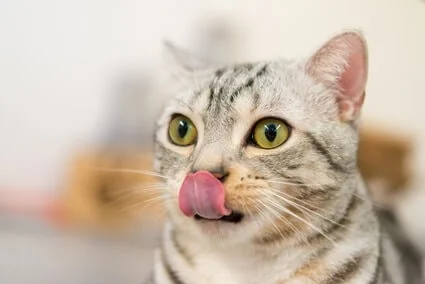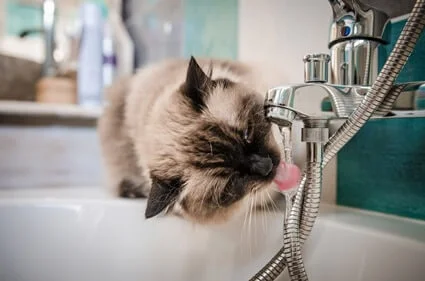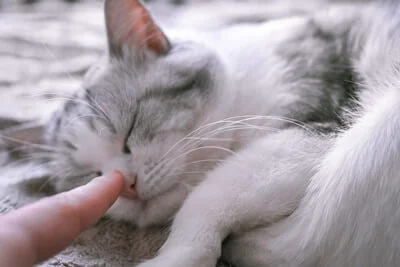If you touch your cat’s nose, you’ll find that it’s normally wet. New owners often believe that their cat has a cold or has nasal discharge due to another illness. That’s made worse if the nose also feels cold to the touch. Of course, there are times where an overly wet nose is a sign that your cat is ill, but that’s not usually the case.
It’s normal for cats to have wet noses. Most of the wet stuff on your cat’s nose is just sweat; cats cannot sweat through their body. It may be excess drainage of tears from the cat’s lower tear ducts. Cats use this as a way to balance their temperature and stay healthy. It’s not a healthy sign if your cat’s nose is dripping wet or very runny, as this is indicative of a nasal illness or infection. A foreign object inside the nasal passage can also be an explanation.
In some cases, it’s also normal for a cat to have a dry nose as well. Much like wet noses, though, if your cat’s nose is overly dry, it may signal that your cat is dehydrated or ill. Keep an eye out for other symptoms.
What is the Wet Stuff On My Cat’s Nose?
Almost all cats have wet noses. If you happen to touch them, you’ll find that cold liquid coming off on your fingers. This wet liquid actually serves a vital role in your cat’s everyday life. In particular, the moisture on a cat’s nose can be one of two things or both:
- Sweat
- Fluid drainage from lower tear ducts
The wet stuff on your cat’s nose is mostly sweat. This is because cats cannot sweat from their bodies in the same way that humans can. Humans have sweat glands dispersed throughout their bodies. On the flip side, cats have sweat glands that are very concentrated in certain areas. These areas include their:
- Paw pads
- Mouths
- Tongues
- Noses
Controlling Temperatures
Cats rely on sweating through their noses to help regulate their body temperatures. When the moisture from their noses evaporates, it helps to cool the skin, as well as the rest of the body. Thus, it decreases a cat’s body temperature.
The amount of sweat that is found on a cat’s nose also varies across its lifespan. It may be more or less intense, depending on the breed of cat.
According to the American Physiological Society, a cat’s body temperature can be affected not only by its environment but also by the food it eats. As such, cats need to balance this with the use of wet noses.
Draining Extra Tears
The drainage from your cat’s lower tear ducts, another source of wetness on your cat’s nose, is normal. This drainage occurs from excess fluid in the eyes. This fluid, also commonly known as tears, is needed to keep your cat’s eyes:
- Lubricated
- Protected from irritants in the air
Any extra tears are drained through the lower tear ducts in your cat’s eyes. It may add to the wet stuff accumulating on your cat’s nose.
Tear drainage, in addition to wetness on the nose, is accompanied by red or brown stains by the eyes. This sometimes makes it look as if your cat has been crying.
According to Behavioural Brain Research, crying invokes a strong reaction in mammals, especially from offspring. However, cats rely on the sound, not the tears, to express emotion. If your cat is tearing up, it’s not upset; it’s draining the extra fluid.
Of course, drainage from your cat’s lower tear ducts is not usually a problem. However, if it’s producing an excessive amount of fluid, then you should take your cat to the vet. It may be experiencing an eye infection or blockage in the tear ducts. This can lead to even worse eye problems if left untreated.
What Does it Mean When a Cat’s Nose is Wet?
A cat’s nose is wet with mostly sweat to help it thermoregulate. You may even notice that your cat’s nose is cold and wet. It is normally not a reason for concern because the nose’s coldness is just indicative of your cat thermoregulating. This is the cooling sensation needed to reduce your cat’s body temperature when it’s too warm.
But is it good for cats to have a wet nose? There most certainly is a benefit, aside from thermoregulation. The moisture on a cat’s nose helps it to trap scent particles in the air.
These trapped scent particles on your cat’s nose can enhance the feline’s sense of smell. This is important in cats, as they rely on scent for:
- Marking territory
- Recognizing other cats, animals, or people
- Finding their way towards food and water sources
Why is My Cat’s Nose Dripping?
You should be concerned with wet noses, however, when your cat’s nose is dripping wet. A cat’s nose should not be really wet or constantly runny, as this is a sign of something wrong.
A dripping nose has abnormal nasal discharge that can be caused by any irritating or infectious agents. However, there are many other potential causes as well. Possible reasons for a dripping wet cat nose include:
- Infectious agents in the nasal passages
- Foreign objects in the nose
- Weak immune system
- Dental disease
- Chronic steroid use
- Chronic vomiting
- Chronic ear inflammation (particularly the middle ear)
- Cancer
Infectious agents in a cat’s nasal passages are among the most common causes of sudden dripping noses in cats. Infectious agents include any virus or bacteria that can be spread to other cats or harms your cat’s health.
Any of these agents in your cat’s nasal passages can be especially worrisome, as they can lead to further complications. This includes the development of upper respiratory infections (URIs). URIs are also known as feline infectious respiratory disease or feline upper respiratory disease complex (URDs).

Infection Symptoms
A dripping wet nose is just one of the many symptoms of URIs. Other common symptoms include:
- Nasal discharge
- Sneezing
- Eye discharge
- Inflammation of the eyelids (conjunctivitis)
Symptoms less specific to URIs, but that may accompany them, include:
- Anorexia
- Lethargy
- Fever
- Enlarged lymph nodes
- Squinting (blepharospasm)
- Mouth ulcers
Discharge from your cat’s nose or eyes can be clear, cloudy, or contain pus or blood. While an upper respiratory infection is not necessarily fatal, it can be contagious to other cats.
Depending on the agent that infected your cat, it may cause your pet to become a chronic carrier. This means that it will carry that infectious agent for life. It may or may not exhibit symptoms. However, regardless if it does or not, it can still spread the infection to other vulnerable cats.
If your cat has received the core vaccinations as a kitten, it will likely be protected against the viral agents that can render it a chronic carrier. There is a non-core vaccination that protects against a certain type of upper respiratory infection, however. It is best to ask your veterinarian’s advice, as the administration is dependent on your cat’s risk and infection status.
Should a Cat’s Nose Always Be Wet?
A cat’s nose is not always supposed to be wet. There are certain environmental conditions and situations in which cat noses should be dry. This does not mean that something is wrong with your cat. In fact, your cat’s nose can change between being wet and dry throughout the day. Think about how your skin or even the moisture in your mouth changes depending on:
- The time of day
- What sort of activities you have been engaging in
It’s the same for your cat. However, much like wet noses, there is a fine line between a dry nose and potential sickness. Be sure to keep an eye out for signs that your cat is not feeling well or that your cat is in pain.
What Does It Mean When a Cat’s Nose is Dry?
Just because a wet nose is normally seen in cats, that doesn’t mean a dry nose indicates sickness. In fact, there are several reasons why your cat’s nose isn’t wet, and many are harmless:
Low Humidity
Low humidity often accompanies the onset of winter or, depending on where you live, the colder months. Cold weather and low humidity levels can cause the moisture on your cat’s nose to evaporate. This can dry out the feline’s nose.
This is because low humidity means that there is a lower amount of water vapor in the air. As such, your cat’s nose will be less likely to contain moisture in the winter months. Aside from the weather, low humidity can also result from the use of heating appliances, such as your:
- Household heater
- Fireplace
- Heating vents
- Heating fans
The heat that is emitted from these appliances tends to dry out the air, lowering the humidity. That consequently dries out your cat’s nose. This is a widespread occurrence if your cat likes to rest near these vents or heating appliances.
Sunbathing
On the other hand, your cat’s nose can become dry from simply being out in the heat. Sunbathing is a commonly well-liked activity among many household cats because it is comfortable and can help them sleep.
As such, your cat may sunbathe or even sleep by a sunny window or door for long periods. As it does, the moisture on its nose dries up from the exposure to heat. This is normal, as water tends to evaporate in warm temperatures.
Sleeping
Probably the simplest explanation of all, a cat’s nose may dry out as it sleeps. This is also true if your cat has just woken up from a long nap. Cats tend not to lick their noses as they rest. Because of that, the sweat or tears there may dry up.
When Should Dryness Be Concerning?
While a dry nose can be normal, it is highly dependent on your cat’s living conditions and the circumstances. A dry nose should raise concerns if your cat’s nose is usually wet or even if the nose suddenly becomes dry.
Certain medical issues in cats begin with just dry noses, but they can develop into something even worse if left untreated. These medical issues include:
- Skin diseases
- Trauma (physical injury, bug bites, etc.)
- Sunburn
- Cancer
However, there is one cause for dryness that is more typical in cats. It is much simpler than you think: dehydration. Dehydration is one of the most common yet concerning issues linked with extremely dry noses in cats. When your cat is dehydrated, the skin on and around its nose will lose all moisture. Here are other signs you’ll find cropping up in a dehydrated cat:
- Dry nose
- Cracked skin on and around the nose
- Lethargy
- Dry, tacky gums,
- Refusal to eat
- Sunken, dull eyes
- Constipation or abnormal-looking feces
- Low heart rate
Under these conditions, a dry cat’s nose should alert you that it’s not feeling well. If you notice that your cat is exhibiting any of these symptoms, get a bowl of clean, fresh water. That may do the trick to bring it back to normal.
Ensure that you are always keeping clean, fresh water readily available for your cat throughout the day. Checking your cat’s nose for normal wetness levels can help you determine if it’s hydrated properly.

Is A Cat’s Nose Supposed To Be Cold And Wet?
The moisture on your cat’s nose can certainly be informative of its health. Cats have wet noses because it:
- Is their main method of regulating their body temperature
- Helps to enhance their sense of smell
- May be excess tear drainage from the cat’s lower tear ducts
In terms of a dry nose, ask yourself what your cat has been doing recently before you worry about its health. Has it been napping, out in the sun, or near any heating appliances? How is the humidity in your living space? Low humidity levels and sun exposure can dry out the skin on your cat’s nose. Remember, also, that it will not lick its nose if it has been asleep.
Is It Good For Cats To Have A Wet Nose?
Just because your cat’s nose can be helpful in determining the feline’s health, that doesn’t mean it’s your only cue. Other aspects can be even more informative of your cat’s health. Look for these symptoms if your cat’s nose becomes suddenly dry or wet:
- Activity levels
- Lameness
- Appetite and thirst
- Fur condition
- Bowel movements
- Urine and feces
- Eye condition
- Weight
- Abnormal lumps
- Scratching or grooming (especially excessively)
- Coughing or vomiting
Do not ignore these other signs. They are your cat’s way of communicating to you how it feels. As an owner, it is important to remain attentive to your cat’s body and mannerisms so that you know when something is amiss. However, it’s healthy and normal for cats to have a wet nose, but it shouldn’t be this way constantly.

